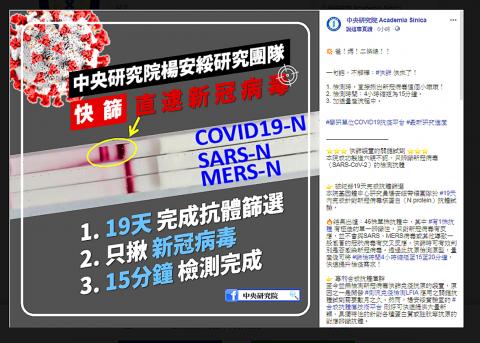Academia Sinica yesterday said that it has synthesized monoclonal antibodies that can identify the protein of the coronavirus that causes COVID-19, which it said is an important step toward producing a rapid screening reagent for the virus.
The potential reagent, if successfully mass produced, would shorten the testing time for COVID-19 from about four hours to 15 to 20 minutes, significantly improving screening efficiency, the nation’s top academic research institution said in a statement on Facebook.
Yang An-suei (楊安綏), an Academia Sinica research fellow at the Genomics Research Center who headed the team that synthesized the antibodies, said that for rapid screening to work, the reagent should accurately identify the new coronavirus.

Screen grab from Academia Sinica’s Facebook page
The team produced 46 monoclonal antibodies in just 19 days, with each sample weighing at least 1mg, based on seven human coronavirus nucleocapsid protein antigens, Yang said.
One of the antibodies has demonstrated “perfect” efficiency in identifying the new coronavirus, because it does not react to other members of the coronavirus family, including those that cause SARS and Middle East respiratory syndrome, Yang added.
Data about the antibodies would be placed on the COVID-19 platform the institute has built to share information with domestic academic and scientific research institutes to speed up the development of rapid screening kits, drugs and vaccines to combat the epidemic, Academia Sinica President James Liao (廖俊智) said.
Yang’s team achieved its goal two months ahead of schedule, Liao said.
Assisted by the Ministry of Economic Affairs, the research team would hold talks with several companies about the production of rapid screening kits based on the research results, Academia Sinica said.
If everything goes smoothly, mass production could begin soon after the Ministry of Health and Welfare verifies and approves the reagent, within the next three to four months, the institute said.
The disease has infected more than 100,000 people in more than 80 nations and territories, including Taiwan, and has killed more than 3,000 people since it was first reported in Wuhan, China, in December last year.

Taiwanese were praised for their composure after a video filmed by Taiwanese tourists capturing the moment a magnitude 7.5 earthquake struck Japan’s Aomori Prefecture went viral on social media. The video shows a hotel room shaking violently amid Monday’s quake, with objects falling to the ground. Two Taiwanese began filming with their mobile phones, while two others held the sides of a TV to prevent it from falling. When the shaking stopped, the pair calmly took down the TV and laid it flat on a tatami mat, the video shows. The video also captured the group talking about the safety of their companions bathing

US climber Alex Honnold is to attempt to scale Taipei 101 without a rope and harness in a live Netflix special on Jan. 24, the streaming platform announced on Wednesday. Accounting for the time difference, the two-hour broadcast of Honnold’s climb, called Skyscraper Live, is to air on Jan. 23 in the US, Netflix said in a statement. Honnold, 40, was the first person ever to free solo climb the 900m El Capitan rock formation in Yosemite National Park — a feat that was recorded and later made into the 2018 documentary film Free Solo. Netflix previewed Skyscraper Live in October, after videos

Starting on Jan. 1, YouBike riders must have insurance to use the service, and a six-month trial of NT$5 coupons under certain conditions would be implemented to balance bike shortages, a joint statement from transportation departments across Taipei, New Taipei City and Taoyuan announced yesterday. The rental bike system operator said that coupons would be offered to riders to rent bikes from full stations, for riders who take out an electric-assisted bike from a full station, and for riders who return a bike to an empty station. All riders with YouBike accounts are automatically eligible for the program, and each membership account

A classified Pentagon-produced, multiyear assessment — the Overmatch brief — highlighted unreported Chinese capabilities to destroy US military assets and identified US supply chain choke points, painting a disturbing picture of waning US military might, a New York Times editorial published on Monday said. US Secretary of Defense Pete Hegseth’s comments in November last year that “we lose every time” in Pentagon-conducted war games pitting the US against China further highlighted the uncertainty about the US’ capability to intervene in the event of a Chinese invasion of Taiwan. “It shows the Pentagon’s overreliance on expensive, vulnerable weapons as adversaries field cheap, technologically